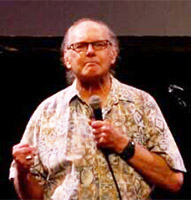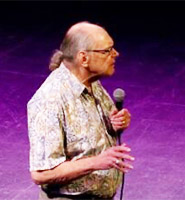Dan Douglas (Botswana) found the love of his life in the Peace Corps
Dan Douglas first told this story on stage at the Des Moines Storytellers Project’s “Love.” The Des Moines Storytellers Project is a series of storytelling events in which community members work with Register journalists to tell true, first-person stories live on stage.
Dan traveled the world in search of adventure. He also found the love of his life.

Dan Douglas (Botswana 1969-71)
In January 1969, I was sitting in the staff room at a secondary school in Gaborone, the capital of Botswana in southern Africa, waiting for the first staff meeting of the term to start. I was a brand-new Peace Corps volunteer assigned to teach English and history.
I had just finished a master’s degree in history at the University of Missouri and decided to take a break from academia and see a bit of the world — hence the Peace Corps.
I had spent the previous summer living with my parents in south Florida, checking the mail every day to see whether the Peace Corps or the U.S. Army got me first. The Peace Corps won and off I went to Botswana, a country I’d never heard of.
I was chatting with the other teachers, mostly Motswana and British, when the headmaster, a not-very-dour Scot named Ian Russell, asked, “Where’s Miss Brand?”
No one knew.
So, he got on the phone and said, “The staff meeting starts in two minutes!”
Three or four minutes later, a lovely, panting, rosy-cheeked young woman dashed in.
I can’t say it was love at first sight, but I was intrigued. And as far as Miss Brand was concerned, I was just another face in the crowd.
I later found out that Felicity Brand was also a volunteer teacher, with International Voluntary Service, a European forerunner of the Peace Corps. She was from London, was in her second year of teaching — and importantly, was single.
After some weeks, I got up the courage to ask her out. We went for a drink in the bar of the President Hotel, the place — and almost the only place — to go to in Gaborone. Felicity has told me I spent much of that first date telling her about my ex-girlfriend.
After that inauspicious start, however, we discovered we had a mutual interest in the culture and people of Botswana and enjoyed visiting the traditional villages outside the capital. We were seeing each other regularly, and went to school staff parties and gatherings at friends’ houses together and were becoming more and more fond of each other.
But there was a small bump in the road: Felicity’s service contract ended in August 1969, and she had to return to London.
We went on a last hitch-hiking trip together, up through the north of Botswana, crossing the Zambezi River at Victoria Falls and eventually getting to Lusaka, Zambia, from where Felicity flew back to England.
We had talked about the possibility of Felicity coming back to Botswana, but we hadn’t made any definite plans.
So, I had a lonely trip back to Gaborone, wondering if our love story was over. I spent a rather bleak autumn writing frequent letters to London and getting letters back almost as often.
In the meantime, Felicity ditched her plan to return to university for a postgraduate course and told her mum that she’d “met someone,” that she was going back to Botswana “to get to know him better” — and that no, she had no intention of getting married.
So, in January 1970, Felicity was on her way back to Botswana, flying into Johannesburg, South Africa, and taking a train up to Gaborone. I met her at the station, overwhelmed with happiness.
She got a teaching job at St. Joseph’s College, a Catholic school a few miles south of the city, and moved back in with her old housemates in Gaborone — Jackie, Liz and Alison. And we saw each other nearly every day.
One evening, Felicity made some moussaka — a Greek eggplant casserole — in my next-door neighbors, Kathy and Rob’s kitchen — they had a better-equipped kitchen than I did — and as she was carrying it into my house, she dropped it — and it splattered all over the floor.
She was, of course, very upset and angry with herself. But I said it wasn’t a problem, got down on my knees and cleaned it up and we dined on salad and a bottle of wine. Perhaps kneeling down to mop up the moussaka gave me the inspiration but during the second glass of wine, I asked Felicity to marry me.
Felicity says that because I had been so nice about the moussaka — or perhaps it was that second glass of wine — she said yes!
The next day we weren’t too certain about what we’d done the night before, and we didn’t talk about getting married again for at least a week.
Eventually, we did write to each other’s mother, introducing ourselves and telling them our plans. Felicity’s mum, Joan, was a bit upset that I simply told her I was going to marry her daughter and not ask for permission. I hastily apologized and asked for her permission, though I’m not sure that she ever actually gave it.
Surrounded by friends and fellow teachers, we officially revealed our engagement at a party at my house. I had roasted a goat in a barbecue pit outside, and everyone was gathered in the front yard, when headmaster Ian clapped his hands to get their attention and made the announcement for us.

At the Des Moines Storytellers Project
We got married on April 23, 1970, in the Cathedral of Christ the King in Gaborone. Felicity wore a long white dress she had bought in a shop in London, not as a wedding dress but just because she liked it, and it was on sale for £5. I was dressed in a white lace-up neck shirt, brown trousers and sandals with no socks — very hip!
Felicity’s mum, brother, Andrew, and his wife, Thea, came out for the wedding — the first time I had met them, of course, and their first visit to Africa. Her mum was a bit unsure about the suitability of this unknown and strange American for her daughter, and I was a bit intimidated by this tall, elegant and very proper English woman.
But during the days before the wedding, we had meals together and did some sightseeing and got to know one another a bit.
The wedding was held during the school break, and most of our friends and fellow teachers were there. My former housemate, Jon, was the best man and official photographer, and Felicity’s brother walked her down the aisle.
We planned to have the reception in the front yard of our house and had left the food and drinks on tables outside. Well into the wedding ceremony, just before the “I do’s,” there was a huge clap of thunder and rain began pelting down. We and the guests looked at each other in dismay.
But, in Botswana, home of the vast Kalahari Desert, rain is a sign of good luck. The Setswana word “pula” means both rain and blessings, and sure enough, Felicity’s housemates had put the tables of food and drink up on the porch out of the rain and headmaster Ian opened up the school hall for us. Felicity’s housemate, Jackie, baked the wedding cake, and the food was catered, not by the fancy President Hotel, but by a more downscale one near the train station.
The next morning, we flew southeast to Lourenço Marques, as it was called then, in Mozambique and spent our honeymoon on an idyllic beach on the Indian Ocean.
Now, two sons, four grandchildren and 52 years later, we’re as happy as we were on that beach in Africa.
Dan Douglas is a professor emeritus in the Applied Linguistics and Technology program at Iowa State University. He and his wife, Felicity, have lived and worked in Botswana, Hawaii, Scotland, Sudan, Japan, Thailand, England and most exciting of all, Ames, Iowa. They have two sons, four grandchildren and friends all over the world.
Love this story. Congratulations on what appears a life well lived…keep up loving one another.
Jim Moon
Jimma, Ethiopia 68-70.
I think your story would make a good memoir, like mine: Love in Any Language.
Wow, what a story, I’m from Botswana, currently reside in Silver Spring Mayland. Proud to hear that you both found love in my beautiful country. I suggest you make a trip back and go and appreciate Botswana’s growth and development. I was taught by Peace Corp volunteers. We thank you for your contribution to our human resource development. There are returned peace corps groups around that I’m a member of. My husband was a peace Corp volunteer in Botswana as well.
Mimmy Polan